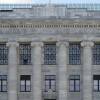Updated at 10:55 p.m. ET:
As the curfew declared by Baltimore's mayor goes into effect, a number of protesters — hundreds, according to The Associated Press — are refusing to leave the streets, and are facing off against gathered police officers.
Protesters threw objects at the police when they first advanced on the crowd, and police responded with smoke grenades and flash grenades at about 10:25 p.m.
To the southeast, National Guard troops could be seen stationed in the city's Inner Harbor entertainment district.
By the end of the hour, though, the main area of the protests appeared to have cleared out.
Elsewhere around the country, there were simultaneous protests in Ferguson, Mo., Chicago and other cities.
Updated at 6:46 p.m. ET:
Maryland Gov. Larry Hogan said National Guard troops and police officers on the streets of Baltimore "will not tolerate violence or looting" of the kind that shook the city Monday.
"We're not going to have another repeat of what happened last night," he said. "That's not going to happen tonight."
Some 2,000 National Guard troops and 1,000 police officers have been deployed in the city to enforce a 10 p.m. to 5 a.m. curfew. The troops were positioned across parts of Baltimore a day after riots that left at least 20 officers injured and more than a dozen buildings damaged, destroyed or looted.
Baltimore police Capt. Eric Kowalczyk said at least 235 people have been arrested, 34 of them juveniles.
Monday's violence started hours after the funeral of Freddie Gray, a 25-year-old black man who suffered a serious spine injury while in police custody. His death on April 19 at a hospital led to several days of mostly peaceful protests.
As NPR reported earlier, the clashes began not far from where the funeral took place, at the New Shiloh Baptist Church in West Baltimore.
Kowalczyk said Baltimore streets have for the most part been quiet Tuesday. Residents were starting to clean up the wreckage of last night's violence, including around Wonder Land Liquors in West Baltimore. NPR's Eyder Peralta says the shop was looted, its shelves stripped bare.
Bonnie Smith, who lives in the neighborhood, told NPR that Mayor Stephanie Rawlings-Blake could have done more to prevent the violence.
"They have to step up, you just can't brush it away just and because it's a certain community and let it go," she said.
Mayor Rawlings-Blake described the riots as "a very rough period" for Baltimore and that it broke her heart to see the damage done to parts of the city.
But she said the way the community came together Tuesday to help reclaim, clean and heal the city, is "a lot more of what Baltimore is about".
"Let me be clear: We will recover, and we will be better on the other side of this," she said.
President Obama criticized those people involved in the riots, saying their actions distracted from the peaceful protests.
"There is no excuse for the kind of violence we saw yesterday. It's counterproductive. When individuals get crowbars and start prying open doors to loot, they're not protesting, they're not making a statement, they're stealing," Obama said during a joint news conference with Japanese Prime Minister Shinzo Abe.
Some businesses have begun to reopen, according to news reports, and a public library in the area hardest-hit by violence was open today.
But the city is still tense. A citywide curfew from 10 p.m. to 5 a.m. has been imposed, starting tonight.
Baltimore's public schools were closed for the day, and some subway stops are closed to avoid police activity, according to The Associated Press. Tonight's Baltimore Orioles-Chicago White Sox game at Camden Yards has been postponed.
The Orioles said their Wednesday game against the White Sox will go ahead, but it'll be closed to the public. The team's three-game series this weekend against the Tampa Bay Rays, had been scheduled to be played in Baltimore but will instead be played in St. Petersburg, Fla.
On Monday, Maryland Gov. Larry Hogan declared a state of emergency in Baltimore. The governor has since temporarily moved his office from the state capital, Annapolis, to Baltimore.
In the light of day, there are questions about why city officials appeared to be caught off-guard by the riots. Baltimore Police Captain Kowalczyk says Monday's protest was billed as "high school protests," and that it would have been wrong to respond immediately with heavy weapons and armor.
Police Commissioner, Anthony Batts echoed those sentiments, saying there were 200-300 police officers at the Mondawmin Mall, where teenagers were throwing rocks and bricks at the officers. Batts said the teenagers, aged 14 - 16 years old, are "old enough to know better...old enough to be accountable, but they're still kids", and the police didn't want to use force.
Police acknowledged that, at least early on, they been outflanked and outnumbered by the rioters, according to The New York Times.
Copyright 2016 NPR. To see more, visit http://www.npr.org/.



